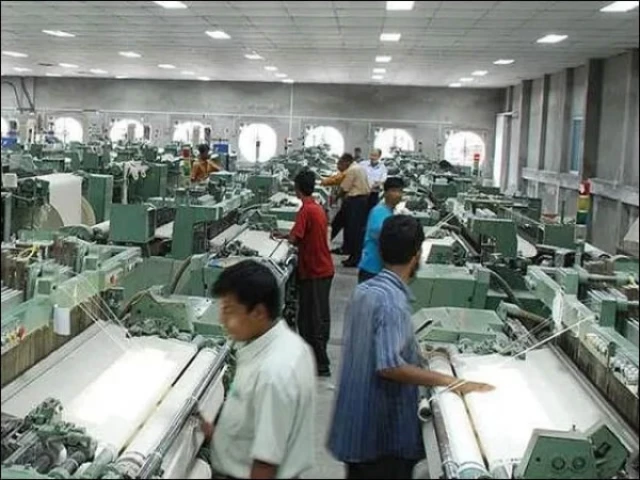Islamabad:
The Textile Council of Pakistan (PTC) raised concerns on Friday about the significant decrease in exports and the closure of industries.
According to a statement of the Council, exports fell 3.83% in the first quarter of the current fiscal year, totaling $ 7.61 billion. In September alone, exports fell sharply by 11.71%, worth $ 2.51 billion.
PTC also noted that the commercial deficit has been extended to $ 9.37 billion during the same quarter, largely due to an increase of 13.49% in imports, exerting substantial pressure on the external accounts of the country.
As a result of these economic challenges, Gul Ahmed Textile has decided to close its export clothing segment, affecting thousands of workers, PTC observed.
Several important multinational companies, including Procter & Gamble, Microsoft and Shell, have left Pakistan or significantly reduced their operations. PTC cited the increase in energy costs, heavy taxes and the uncertainty of politics as key factors that drive these decisions.
The Council urged the Government to implement immediate reforms, warning that without rapid actions, more industries could close and the investment can continue to decrease.
The president of the PTC, Fawad Anwar, emphasized the need to provide competitive energy rates regionally for export industries, improve tax policies and rationalize the refund system to support the export sector. He warned that without these measures, the country runs the risk of greater contraction in exports, which would negatively affect the economy.
PTC previously criticized the recent amendments of the Federal Income Board (FBR) to the export facilitation scheme (EFS), warning that the changes represent a direct threat to the survival of textile and clothing exports in the country.
Read: The textile sector seeks political interventions
PTC, which represents more than 30% of textile and clothing exports in the country, presented a formal set of objections and recommendations to the FBR in response to SRO 1359 (1)/2025 dated July 29, 2025.
The presentation of the PTC, in line with the five -day window provided feedback, strongly criticized the recent amendments to the EFS, warning that the changes could paralyze the export sector of added value of Pakistan at a time of greater global economic uncertainty.
He stressed that the EFS guarantees competitiveness for textile and clothing exporters. However, the amendments not only overlooked the recommendations of a high -level government committee, led by the Minister of Planning Ahsan Iqbal, but also introduced restrictive and little practical conditions that threaten the survival of the sector.
One of the most harmful provisions, according to the PTC, is the exclusion of cotton, cotton thread and gray cloth of the EFS reach. “This clause must immediately withdraw,” said the Council, since it was never agreed that these materials would be excluded. At most, a general sales tax (GST) reimbursable on cotton thread above a certain count was under discussion. “Its general elimination of the scheme is unjustified and economically reckless.”
Anwar described the measure as a “export tax”, saying that it would impose a severe financial burden for exporters who already deal with global protectionism, the increase in supplies costs and new commercial barriers, including recently imposed reciprocal tasks by the United States. “The moment could not be worse. Exporters are under stress and, instead of supporting them, the government is promoting policies that increase costs and complicate operations,” he said.
The PTC policy note recommended that the period of use of the entry remain at 18 months, with the possibility of an extension of six months by the regulatory authority. Any extension beyond that must be subject to the approval of a committee designated by FBR. In addition, the Council suggests that unused input materials must be carried out the following year when presenting a conciliation statement.
Read more: Textile policy for the industry to be competitive
The authorization mechanism for entry acquisition must be more flexible. For new EFS users, the regulatory authority can approve provisional authorization up to 50% of the claimed production capacity, and the rest is granted capacity verification by the organization of income output coefficients (IOCO).
The Council urged the FBR to move from bank guarantees to insurance guarantees, noting that the latter would significantly reduce the burden of compliance and financial stress for exporters. He highlighted the operational impracticability of the new supplier restrictions in toll manufacturing.
According to the current amendment, the goods sent for external processing must be returned within 60 days, the details of the supplier must be recorded previously and any subsequent change requires the prior approval of the collection. The PTC argued that these requirements are unnecessarily rigid and interrupt operational flexibility and negotiations with subcontractors. He urged the elimination of excessive data requirements, such as the number of vehicles, and requested the extension of the duration of toll manufacturing.
The Council rejected the proposed rule that requires physical sampling to verify the use of imported entries. He requested the reincorporation of the sampling provisions marked with the original exam, emphasizing that the new rule would delay exports and create bottlenecks in the verification process. Finally, and the most critical, the PTC demanded the immediate reversal of the exclusion of cotton, cotton thread and gray fabric of the EFS. These materials are fundamental for the textile value chain and exclude them will force exporters to have tariffs and import taxes in advance despite being networks of net currencies.




